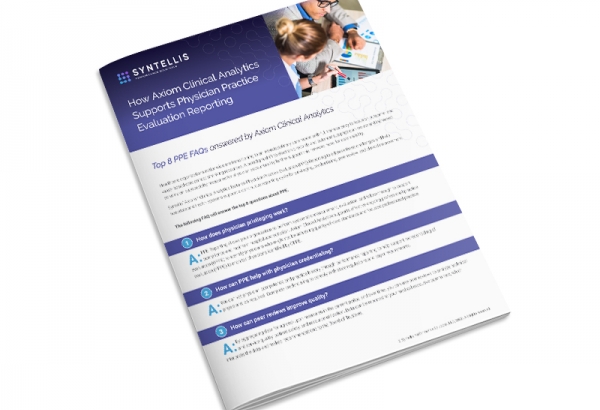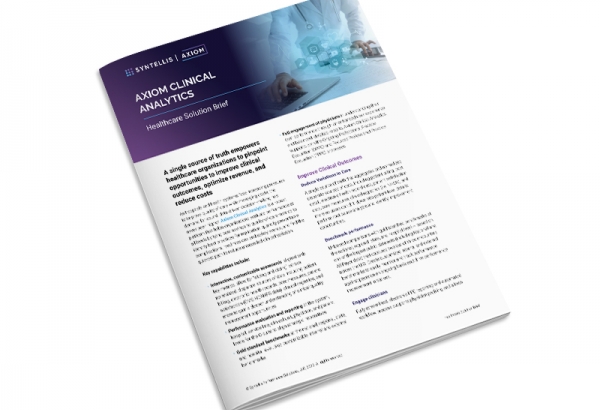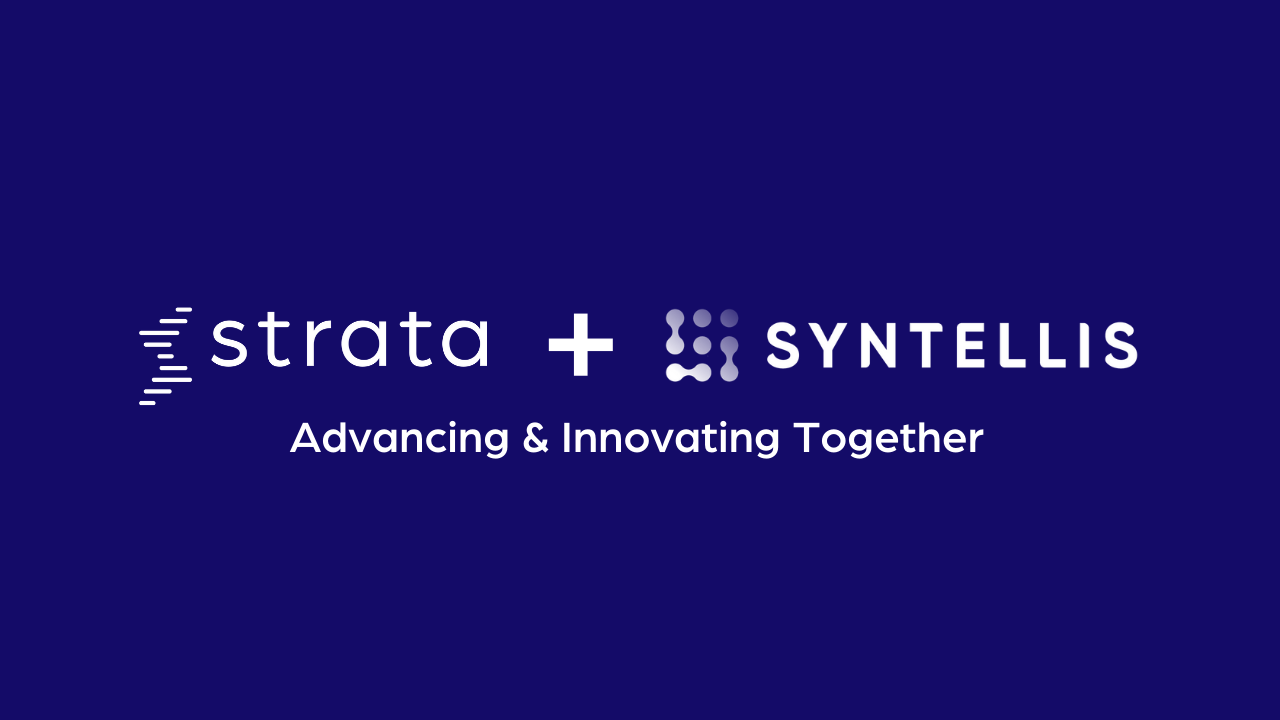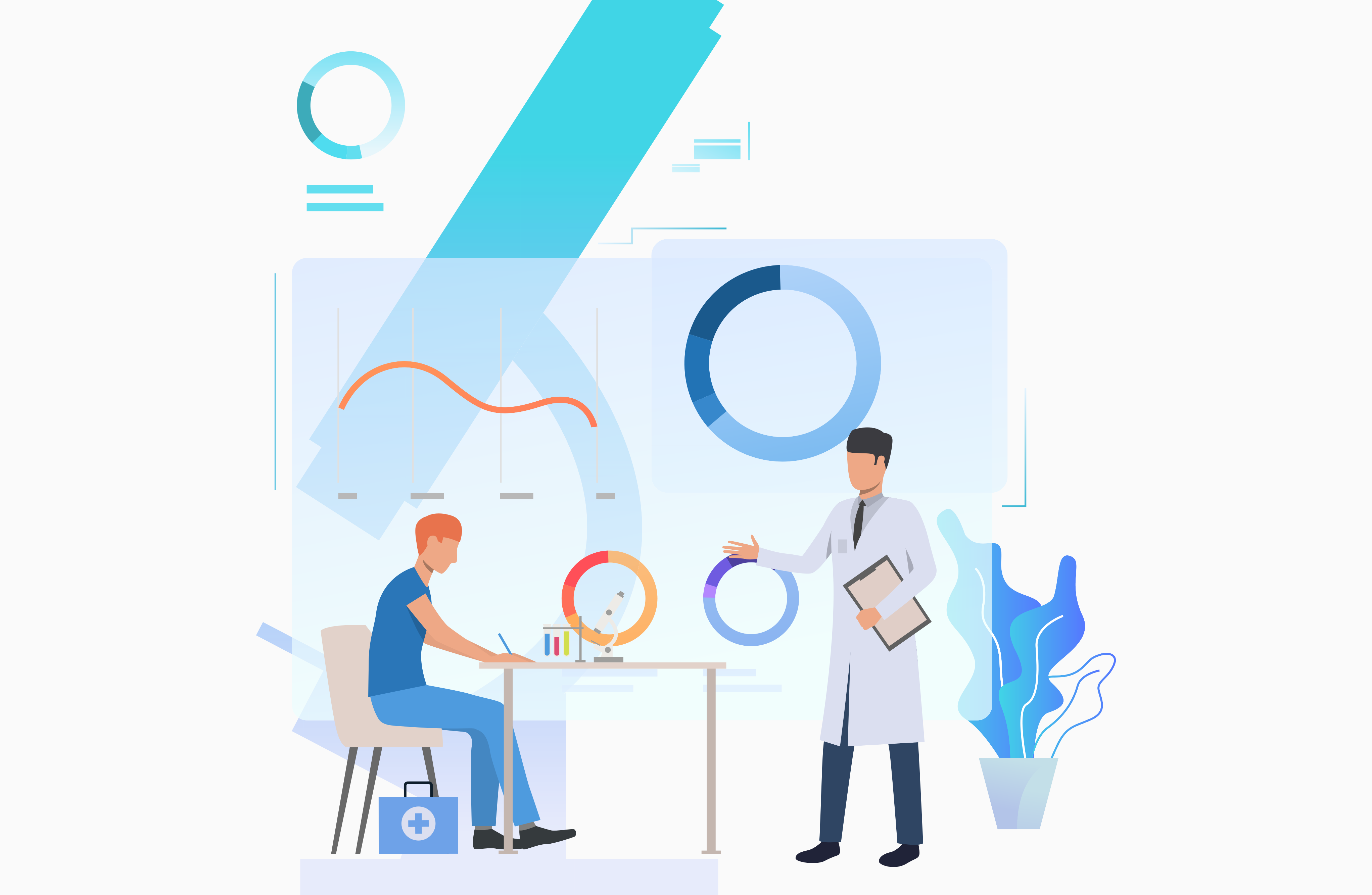Assessing provider performance and monitoring credentialing and quality-of-care standards are some of the most critical tasks hospitals undertake. And when administered well, ongoing physician performance evaluation (OPPE) is both easy and supports quality improvement.
Though regulatory bodies require physicians to be reappointed every two years, most healthcare organizations prefer more frequent monitoring — performing reviews every four to six months. Outdated documentation and manual reporting methods, such as spreadsheets, make these frequent OPPE review cycles time- and labor-intensive but advanced analytics and reporting tools, such as Syntellis’ Axiom™ Clinical Analytics, simplify OPPE processes and support ongoing quality improvement by making it easy to:
- Meet accreditation needs
- Augment focused studies
- Automate physician attribution
- Improve clinical transparency
- Promote physician leader autonomy
1. Meet Accreditation Needs
All healthcare organizations must evaluate and validate physicians’ performance at regular intervals according to their accreditation or regulatory body’s standards. Axiom Clinical Analytics’ OPPE functionality supports complete credentialing to comply with state regulations and payer requirements, as well as performance reporting to assist with recredentialing when required.
Syntellis customer Baptist Health Care, for example, is governed by the Centers for Medicare and Medicaid Services (CMS) and DNV Healthcare. To appoint or reappoint candidates, these governing bodies require health systems to report individual performance data for providers including nurse practitioners, physician assistants, and other advanced practice providers (APPs). Baptist Health Care worked with Syntellis to extend Axiom Clinical Analytics’ existing OPPE reporting for physicians to include APPs. Now, the health system quickly provides OPPE data for all providers and effortlessly meets accreditation requirements.
2. Augment Focused Studies
To hire or grant privileges to a new provider, hospitals must perform focused professional practice evaluation (FPPE) studies that concentrate on factors specific to the physician’s specialty, including readmissions, complications, and social determinants of care. Health systems may also use focused studies to monitor physicians who may not be achieving quality-of-care standards over time.
Axiom Clinical Analytics’ OPPE reporting can augment FPPE studies to streamline privileging and ensure that all new providers meet the hospital’s quality standards.
3. Automate Physician Attribution
Tracking quality-of-care data depends on physician attribution, which can be complicated when multiple physicians provide care for an individual patient. Axiom Clinical Analytics uses a powerful physician attribution model to identify which provider made the largest contribution to an individual patient’s outcomes of care. The algorithm, which accounts for elements including cost, orders, ordering physician, diagnostic and procedural coding, and diagnosis-related group, provides a data-backed way to automate the physician attribution process.
This feature is also available for APPs, so hospitals can automate attribution for APPs in the same way they do for physicians.
4. Improve Clinical Transparency
In any professional environment, transparency helps build trust and strengthen relationships. Transparency in a healthcare environment ensures that physicians understand where they currently stand and see their own opportunities for improvement. With Axiom Clinical Analytics, physicians can access and explore their OPPE reports, drilling into their cases through physician scorecards and interactive dashboards.
With this feature, hospital administrators can manage and track all reporting and physicians can see their own pending and completed reviews.
5. Promote Physician Leader Autonomy
In many OPPE systems, reporting is the same for all physicians regardless of specialty. Cookie-cutter reporting makes it difficult for departments and individual providers to access the data that’s most important to maintaining their unique team’s quality of care.
Axiom Clinical Analytics promotes autonomy for physician leaders, enabling each department to determine the categories and measures to include in their reporting, as well as make changes when needed. This allows hospitals and individual physicians to track the data they consider most valuable to their specialty and patients.
With Axiom Clinical Analytics, hospitals and health systems see a 50% decrease in time spent on data management and reporting. Clinical Analytics offers capabilities beyond OPPE as well, empowering organizations to analyze disparate sources of data — including patient billing, electronic health record data, patient satisfaction data, and core measures — to identify improvement opportunities.
Equipped with a single source of truth, healthcare organizations can hire and retain quality providers, enhance clinical outcomes, and optimize revenue. For an in-depth view of Axiom Clinical Analytics’ reporting capabilities, including OPPE, request a demo.
You also might be interested in...

Axiom Clinical Analytics Physician Practice Evaluation Reporting

Garnet Health Improves Outcomes and Reduces Readmissions Using Axiom Clinical Analytics


